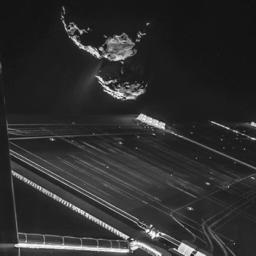
We live in amazing times.
Ten years after the mission was conceived and set into motion, European scientists have landed a spacecraft on the surface of a comet. Despite the fear stemming from the unknown consistency of the comet's surface, which could have ranged from powdery to tarry frozen to anything in between, Philae sank only 4cm into the surface, which indicates perhaps a slight coating of dust.
Over the coming months as Philae piggybacks on the comet and Rosetta maintains orbit, the data they send back could be key to unlocking answers about the formation of the Solar System, the origins of water on Planet Earth and perhaps even life itself.
Rosetta selfie with Comet 67P in background
The challenge for the flight team operating Rosetta from back on Earth was to land Philae on a rotating, duck-shaped comet travelling through space at 18km/s (40,000mph).
The BBC has tons of coverage of the event. Amazing, simply amazing. If you checked my productivity and web-browsing habits today, you'd discover I checked into the BBC's live coverage this morning and was glued to it for the rest of the day. I wasn't around when we landed on the moon, but this is an even more impressive, technical feat. Congrats to everyone who made this happen!
 We live in amazing times. Ten years after the mission was conceived and set into motion, European scientists have landed a spacecraft on the surface of a comet. Despite the fear stemming from the unknown consistency of the comet's surface, which could have ranged from powdery to tarry frozen to anything in between, Philae sank only 4cm into the surface, which indicates perhaps a slight coating of dust.
We live in amazing times. Ten years after the mission was conceived and set into motion, European scientists have landed a spacecraft on the surface of a comet. Despite the fear stemming from the unknown consistency of the comet's surface, which could have ranged from powdery to tarry frozen to anything in between, Philae sank only 4cm into the surface, which indicates perhaps a slight coating of dust.
source: http://www.bbc.com/news/science-environment-30034060